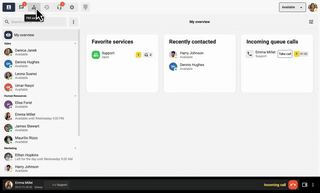These days, almost everyone takes their business phone abroad – whether it’s for a two-day business trip to Austria or a three-week vacation to Thailand. But if you don’t keep track of your mobiles, you could end up with a hefty bill afterwards! Here are some tips on how to control the use of your company’s mobile phones, and why you need to pay extra attention to your calling and surfing costs.
Ten years ago, being able to use your business phone abroad without worrying was a much bigger challenge than it is today. In 2017, roaming regulation was introduced, allowing you to travel anywhere in the EU, making calls and surfing for the same price as in your home country.
If you’re in Germany on a business trip, it’s just as easy to talk to colleagues in Munich as it is to call home in Malmö. So nowadays, there’s no problem taking your business phone abroad – as long as you stay within the EU. In other countries, however, it’s important to be aware of the rules!
Varying prices from country to country
There are countries outside the EU that have rules and operators that are very different from those we are used to. In some cases, it can be extremely expensive to use your phone at all, whether you are making calls, receiving calls or browsing. In Russia, for example, it is not uncommon for it to cost you tens of dollars just to answer a call. It is therefore essential to be aware of the prices and other guidelines in the country you are traveling to – it can be much more expensive than you think!
Better reception abroad than at home
Although phone costs outside the EU vary, surfing and calling is usually straightforward. Coverage is usually excellent, as is the sound. In many cases, you’ll also get better reception when you enter a new country – because all the different operators in that country are fighting over you!
Getting tourists and business travelers alike to use their networks is important – which means they actively work to intercept your calls and browsing. This means that when you travel to a country outside the EU, you will often have a faster and better connection than within the borders.
How to get control of your business mobiles abroad
Most companies have a policy on how employees who travel frequently on business should use their phones. In the best cases, they also have a telephony provider that can help regulate and control how the phone is actually used.
A common guideline is to set a limit for international data – that is, the person can only surf up to a certain amount, say €50, and then it stops automatically. If the person does not actively agree to continue surfing, or buys more surfing beyond the contract, this avoids an expensive surprise when the bill arrives.
Always free to call via wifi
Businesses using a cloud-based IP telephony solution have an additional advantage that can minimize high costs, especially outside the EU. By having a policy governing how and when to use your phone abroad, you can regulate that outgoing calls, for example, can only be made via the internet and the mobile app – as it is then completely free to call.
Reading tips: Why your business needs a phone policy
Control permissions abroad depending on who is traveling
As the IT manager or person responsible for telephony in the company, it is important to also find out who will actually be using the mobile phone a lot abroad in the company, and be clear about the guidelines here. With a good telephony solution, you can even control each user’s mobile subscription separately and grant access by role or area of use. For example, a support staff member may not be able to use their work mobile while on holiday in Sri Lanka. Look at your specific user patterns, and work out who should have access to what.
There may be 5-10 employees across your company who travel outside the EU a lot on business – and they may often go to the same region. By analyzing which countries you actually visit frequently, you can evaluate which solution best meets your employee’s needs, without breaking the bank. Will a salesperson be based in Beijing for three months? That’s likely to require a different type of mobile solution than if the manager is going on a buying trip to London for a week!
Tip. A phone policy is a good way to control employees’ phone use, both in the office and abroad. How to write a good phone policy.
eSim is a solution for recurrent travel
For colleagues who often travel to the same countries, you can also combine your regular SIM card with an electronic one, which you always have in your phone and can switch on and off. Often there are providers that are good at roaming in certain countries, and where you can therefore call and surf at better prices than with your regular provider. With an e-sim with a specific operator, you can keep costs down abroad, while continuing to use your company’s chosen solution at home. A plus is that the employee does not have to bother with changing physical SIM cards every time!
Want to know how best to help your employees use their mobiles properly – and work smarter both internally and with customers? In our guide“How to manage your company’s mobile phones and avoid expensive subscriptions“, we give you our top tips!


